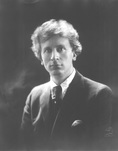Percy Grainger

Born in Brighton, Australia, Percy Aldridge Grainger is best remembered as a pianist of great skill and a composer of many memorable tunes for piano.
The arrangement and compositional skills shown in his settings of many folk songs collected by him, as well as his original works for wind ensembles, are still considered pinnacles of achievement over half a century later.
Many of his works are of consummate difficulty to perform but demonstrate superbly the amazing range of tonal colour and expression that a good wind band can produce.
Percy Grainger was a great admirer of the sounds of Wind ensembles. In his own program notes about Lincolnshire Posy he wrote:
“Why this cold-shouldering of the wind band by most composers? Is the wind band, with its varied assortments of reeds, so much richer than the reeds of the symphony orchestra, its complete saxophone family that is found nowhere else (to my ears the saxophone is the most expressive of all wind instruments – the one closest to the human voice. And surely all musical instruments should be rated according to their tonal closeness to man’s own voice!), its army of brass, both wide-bore and narrow-bore, – not the equal of any medium ever conceived? As a vehicle of deeply emotional expression it seems to me unrivalled.”
The arrangement and compositional skills shown in his settings of many folk songs collected by him, as well as his original works for wind ensembles, are still considered pinnacles of achievement over half a century later.
Many of his works are of consummate difficulty to perform but demonstrate superbly the amazing range of tonal colour and expression that a good wind band can produce.
Percy Grainger was a great admirer of the sounds of Wind ensembles. In his own program notes about Lincolnshire Posy he wrote:
“Why this cold-shouldering of the wind band by most composers? Is the wind band, with its varied assortments of reeds, so much richer than the reeds of the symphony orchestra, its complete saxophone family that is found nowhere else (to my ears the saxophone is the most expressive of all wind instruments – the one closest to the human voice. And surely all musical instruments should be rated according to their tonal closeness to man’s own voice!), its army of brass, both wide-bore and narrow-bore, – not the equal of any medium ever conceived? As a vehicle of deeply emotional expression it seems to me unrivalled.”

